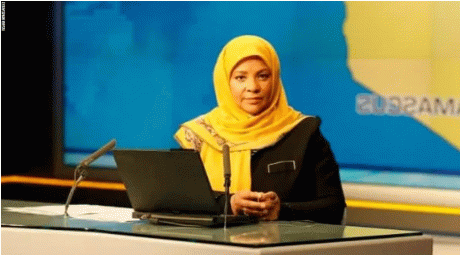This piece was reprinted by OpEd News with permission or license. It may not be reproduced in any form without permission or license from the source.
"I was talking to people until about 2 in the morning about your case. I have several different channels working on it, but to be honest with one of them, he said they got suspicious that on one hand, you said u have no money, and on the other hand u r going from country to country," Hashemi allegedly texted Witt.
The IRGC appeared initially suspicious of Witt, but eventually helped her obtain a visa through Iran's embassy in Dubai. "I'm signing off and heading out! Coming home:)," Witt texted Hashemi on August 28, 2013, the day she defected.
Mehanna of New Horizon described Hashemi as Witt's "handler." The DOJ indictment referred to the Iranian-American journalist as a "spotter or assessor on behalf of the Iranian intelligence services."
Hashemi rejected these characterizations. In a statement to The Grayzone, she declared:
"I am a journalism [school] graduate with decades of experience. I have interviewed people from around the world and maintained contact with many of them, just like any other journalist. I happen to be living and working in Iran. Journalism is not a crime. It is not being a spotter, nor a fixer, nor a pawn for US foreign policy."
In Iran, Witt adopted a new identity as Fatemah Zahra. According to her indictment, she began collaborating with hackers to spearphish information from US intelligence agents she identified.
It was not until July 2018, almost five years since Witt slipped into Iran, that the US government issued a secret indictment against the former Air Force analyst.
In January of the following year, Hashemi took a trip to the US to visit members of her family. Unaware of the indictment of Witt, she headed straight into a US dragnet.
The arrest and interrogation of HashemiMarzieh Hashemi was born in Louisiana as Melanie Franklin in 1959. After meeting revolutionary Iranian students at age 22 and converting to Islam, she changed her name and moved to Iran during the early 1980's.
In January 2019, Hashemi traveled to New Orleans to visit her family. Next, she headed to St. Louis to film a documentary about the Black Lives Matter movement. While she boarded a flight at St. Louis Lambert International Airport, on her way to meet her son, Hossein, in Denver, she was arrested by federal agents and immediately transported to Washington DC.
Initial reports on Hashemi's arrest stated that she was a "material witness," but offered no further information. Her son told the Associated Press, "we don't have any information along those lines" when asked if she was being investigated in connection to any crime.
While in prison, Hashemi was unable to communicate with her family for four days. "While being held without charge, I was forced to remove my hijab and denied adequate clothing or food," Hashemi told The Grayzone. "Similar treatment of other Americans has been found to be unlawful."
It took ten days before Hashemi appeared in a courtroom, and by then, protests against her detention had erupted from Washington to Tehran.
"The FBI hates us"On January 30, a week after her federal grand jury appearance and subsequent release from custody, Hashemi returned to a hero's welcome in Tehran. Received on the tarmac by throngs of chanting supporters, the Press TV anchor held a press conference where she denounced "a campaign of disrespect and intimidation" in the US.

Among those waiting to welcome Hashemi back to Iran was Mehanna, the New Horizon co-founder.
(Image by The Grayzone) Details DMCA
(Note: You can view every article as one long page if you sign up as an Advocate Member, or higher).





